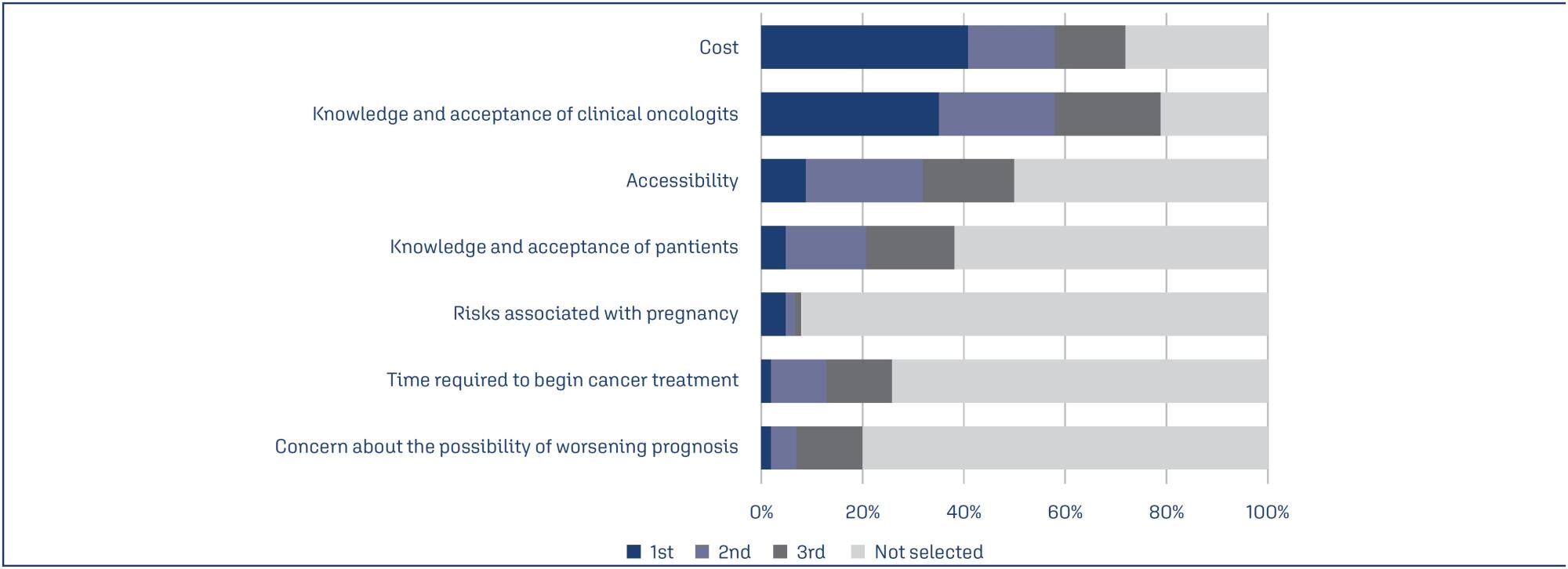Summary
Revista Brasileira de Ginecologia e Obstetrícia. 2024;46:e-rbgo25
Fertility preservation is a priority in oncology for female cancer patients. However, there is a lack of communication between infertility specialists and oncologists. This study aimed to evaluate infertility specialists’ perceptions and experiences regarding fertility preservation.
Conduct an online survey to profile infertility specialists. Participants were infertility affiliated with the Brazilian Federation of Gynecology and Obstetrics Associations (FEBRASGO). The specialists received an online survey, which response rate were 30.9%, most of whom were in southern and southeastern. The survey consisted on 14 questions about the infertility specialists’ location, techniques in clinical practice, treatment successful rate, patients idea, etc.
The average experience in human reproduction were 15.5 ± 10.2 years (mean ± standard deviation, range 1-40). Among reproductive-aged female cancer patients recommended for fertility preservation, 60.3 ± 28.8% (range 10-100%) underwent preservation procedures. Main barriers were cost (41%), oncologists’ knowledge or acceptance (35%) and accessibility (9%). Most infertility specialists (58%) considered 40 years the limit for fertility preservation. Leukemia, lymphoma, breast and ovarian cancers were prioritized for fertility preservation, while lung, thyroid, gastric, and brain cancers were less relevant.
This is the first Brazilian study about infertility specialists’ perceptions on oncology patients access to fertility preservation. These patients primarily receive treatment in the public health system, while infertility specialists mainly work in the private healthcare. This healthcare mode is currently fragmented, but integrating these experts is enhancing patient access to fertility preservation. Studies on this topic are still warranted.

Summary
Revista Brasileira de Ginecologia e Obstetrícia. 2023;45(9):524-534
To assess the knowledge, attitude, and practice of Brazilian physicians about immediate postpartum and postabortion intrauterine device insertion.
Cross-sectional online survey involving physicians on duty in public Brazilian hospitals. Participants answered an anonymous questionnaire with close-ended questions to assess their knowledge, attitude, and experience on the immediate postpartum and postabortion insertion of copper intrauterine devices.
One hundred twenty-seven physicians working in 23 hospitals in the 5 geographic regions of Brazil completed the questionnaire. Most were female (68.5%) and worked in teaching hospitals (95.3%). The mean (standard deviation) knowledge score (0–10 scale) was 5.3 (1.3); only 27.6% of the participants had overall scores ≥7.0. Most physicians (73.2%) would insert a postpartum intrauterine device in themselves/family members. About 42% of respondents stated that they had not received any training on postpartum or postabortion intrauterine device insertion. In the past 12 months, 19.7%, 22.8%, and 53.5% of respondents stated they had not inserted any intrauterine device during a cesarean section, immediately after a vaginal delivery, or after an abortion, respectively.
Most study participants have a positive attitude toward the insertion of intrauterine devices in the immediate postpartum period, but they have limited knowledge about the use of this contraceptive method. A large percentage of respondents did not have previous training on postpartum and postabortion intrauterine device insertion and had not performed any such insertions in the last 12 months. Strategies are needed to improve the knowledge, training, and experience of Brazilian physicians on immediate postpartum and postabortion intrauterine device insertion.
Summary
Revista Brasileira de Ginecologia e Obstetrícia. 2022;44(4):391-397
To determine knowledge, attitude, and preventive (KAP) practices towards the SARS-CoV-2 (COVID-19) pandemic among women in reproductive age seeking to use copper or hormonal intrauterine devices (IUD/LNG-IUS).
We conducted a cross-sectional study in which we applied a questionnaire on 400 women about KAP practices on COVID-19 at the University of Campinas, Campinas, SP, Brazil, from May to August 2020.
The mean (±SD) age of the women was 30.8±7.9 years, and 72.8% of them reported being pregnant at least once. Most women (95%) had heard or read about COVID-19, and their main sources of information were television (91%) and government websites (53%). However, 53% of the women had doubts about the veracity of the information accessed.
Women without a partner and with>12 years of schooling had more information about COVID-19 and on its impact on new pregnancy, and those from high socioeconomic status had a higher chance of maintaining physical distance. Safety, effectiveness, comfort, and absence of hormone in the contraceptive method (in the case of TCu380A IUD) were the main reasons for the participants to seek the service during the pandemic, and the possibility to stop menstrual bleeding was the main reason to choose the LNG-IUS.